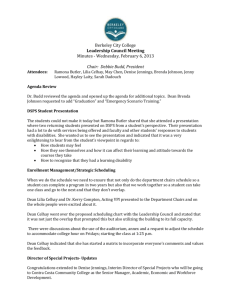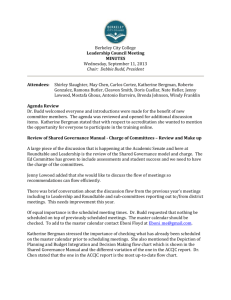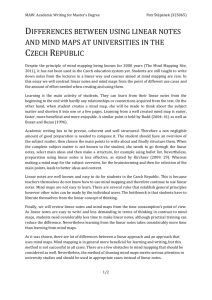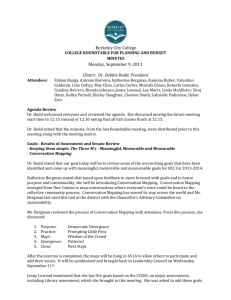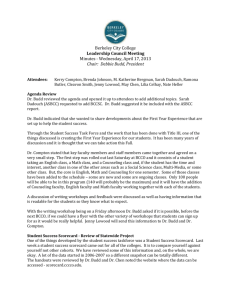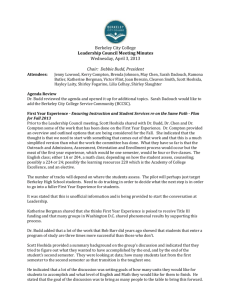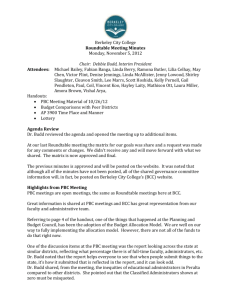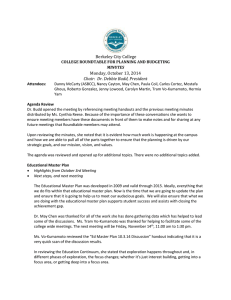Roundtable Minutes – 102714 – Final
advertisement
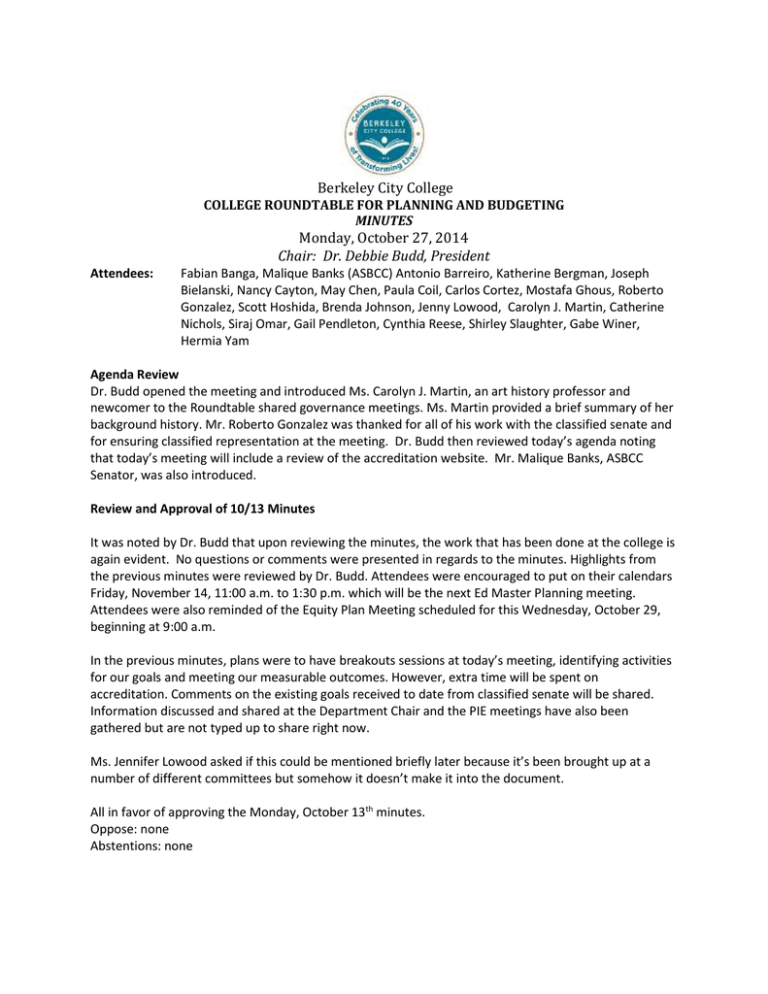
Berkeley City College COLLEGE ROUNDTABLE FOR PLANNING AND BUDGETING MINUTES Monday, October 27, 2014 Chair: Dr. Debbie Budd, President Attendees: Fabian Banga, Malique Banks (ASBCC) Antonio Barreiro, Katherine Bergman, Joseph Bielanski, Nancy Cayton, May Chen, Paula Coil, Carlos Cortez, Mostafa Ghous, Roberto Gonzalez, Scott Hoshida, Brenda Johnson, Jenny Lowood, Carolyn J. Martin, Catherine Nichols, Siraj Omar, Gail Pendleton, Cynthia Reese, Shirley Slaughter, Gabe Winer, Hermia Yam Agenda Review Dr. Budd opened the meeting and introduced Ms. Carolyn J. Martin, an art history professor and newcomer to the Roundtable shared governance meetings. Ms. Martin provided a brief summary of her background history. Mr. Roberto Gonzalez was thanked for all of his work with the classified senate and for ensuring classified representation at the meeting. Dr. Budd then reviewed today’s agenda noting that today’s meeting will include a review of the accreditation website. Mr. Malique Banks, ASBCC Senator, was also introduced. Review and Approval of 10/13 Minutes It was noted by Dr. Budd that upon reviewing the minutes, the work that has been done at the college is again evident. No questions or comments were presented in regards to the minutes. Highlights from the previous minutes were reviewed by Dr. Budd. Attendees were encouraged to put on their calendars Friday, November 14, 11:00 a.m. to 1:30 p.m. which will be the next Ed Master Planning meeting. Attendees were also reminded of the Equity Plan Meeting scheduled for this Wednesday, October 29, beginning at 9:00 a.m. In the previous minutes, plans were to have breakouts sessions at today’s meeting, identifying activities for our goals and meeting our measurable outcomes. However, extra time will be spent on accreditation. Comments on the existing goals received to date from classified senate will be shared. Information discussed and shared at the Department Chair and the PIE meetings have also been gathered but are not typed up to share right now. Ms. Jennifer Lowood asked if this could be mentioned briefly later because it’s been brought up at a number of different committees but somehow it doesn’t make it into the document. All in favor of approving the Monday, October 13th minutes. Oppose: none Abstentions: none -2Review of Vision 2024 Goals and Vision 2024 Vision Indicators Dr. Budd referenced the landscaped vision 2024 document along with the Classified Senate meeting documentation of feedback dated October 9th. The floor was then given to Ms. Lowood who discussed one of the goals. She indicated that it had come up at PIE, and just recently at the Department Chairs Council, and they wanted to have one of the goals clarified. The core of the goal as stated by Ms. Lowood is “to maintain high quality instructional and student services programs.” The measurable assessment would be through ongoing implementation of assessment action plans. Referencing the last Roundtable meeting Dr. Budd stated that we have approved and posted the annual goals, and that it is written in the document. She did not want people to get confused as this is not just the annual goals being discussed. These are also our long-term goals that we will continue to consider as we are writing and updating our Ed Master Plan and, while developing our equity plan and our student success and support programs. Dr. Budd agrees that Ms. Lowood’s recommendation needs to be added to the Vision 2024 and stressed that it was added to the annual goals. At the department chairs meeting there was a question about the statement, “at least 70% successful course completion,” and the word “all” as this word was a concern. Dr. Budd indicated that this goes hand-in-hand with comments that were made at the Classified Senate meeting. She added that currently our Asian and White students are at about 70% successful course completion, our AfricanAmerican students are at 50%, and our Latino students are at about 60%. The goal, when using the term “all,” means all students no matter the race, ethnicity or social economical status. In clarifying the discussion from the chairs meeting, Mr. Barreiro stated that if we are defining “all” as meaning every individual student then that was the area questioning if this is the language we want to use. To get to Ms. Lowood’s point, he added that there is acknowledgement that there are individual students who are on an important path but, they are not on one that would necessarily lead to 20 transferable units; by intention and by design. Dr. Budd referenced the second bullet on the landscaped Vision 20204 document which says, “Ensure all…students who have an education goal of certificate, degree and/or transfer.” Enter a program pathway by their second semester Complete 20 transferable units or a stackable certificate by the end of the first year. Dr. Budd stated that she sees this as our audacious goal for 2024 and sees our responsibility annually as identifying a certain percentage as our measurable outcome of the goal. As we continue to increase that, ideally we can get to that. These are all in line with our degree and certificate completion of going into an overarching goal. As reported by Mr. Roberto Gonzalez, many of the concerns of Classified Senate are similar and he feels we are talking about semantics. He wonders if the word all might be replaced by a certain percentage. For example, does it mean the same if we substitute 100% for the word “all.” Does that change the conversation? If it does, perhaps we should consider what a realistic goal would be for 2024. -3- Dr. Chen spoke on the subject from a statistical and definition point of view stating that the 70% of successful course completion is based on the census roster. 1. Faculty members have to do a diligent first census roster reporting students who did not attend or missed a lot of classes. 2. All students complete 70% with a successful passing grade. Not everyone needs to complete 12 units or 3-4 courses each semester. She pointed out that for #2 we are talking about program pathways, not majors. Dr. Budd asked the students for their thoughts on the conversation. Mr. Malique Banks indicated that there are a lot of questions that come up when we say “all.” Dr. Budd provided a brief summary of our goal of eliminating the achievement gap and ensuring African American and Latino students are at the same successful course completion rate as Whites and Asians, or better. The 70% is a piece of closing the achievement gap. Ms. Lowood recommended saying “ensure students in all demographic groups have at least 70% successful course completion.” This was felt to be okay by Dr. Budd, if it helps to understand that we are looking to close the gap. Another piece is that there may be a need to make the second bullet regarding the 20% clearer. When talking about 20 transferable units and the 70% course completion Mr. Barreiro pointed out that for a student to achieve that they need to be taking 15 transferable units per semester. By definition it means that our basic skills students can’t achieve this. For the Vision 2024 Goals, Ms. Lowood referenced the second bullet again stating that she believes the problem with the word all is that we meant all demographic groups, not all students. She stated that maybe the second one could be, “Ensure X percent of first-time college students in all demographic areas who have an educational goal of certificate, degree, and/or transfer etc.” Ms. Hermia Yam reported that in thinking of the SSSP, one of the requirements is that the students need to have a comprehensive education plan by the end 15 transferable units. Whether a student comes in to counseling, whether they complete 5, 10, or 15 units, they will be talking to them about their workload and family commitments to help them achieve the 20 transferable units or stackable certificate. She indicated that she does have a concern about the term “all new first time college students” as some students may not be thinking about a transferable degree or matriculation. Ms. Yam also noted in reviewing the Classified Senate minutes, that we may need to align with Financial Aid requirements, the SSSP standards and also the audacious goals. By aligning these it will be less confusing the students, counselors and instructional faculty. Focusing on the second portion, new first time degree, certificate and transfer seeking students, Dr. May Chen reported that this is the cohort we are talking about. The two indicators of our scorecard that the state published were noted on the board and discussed. Increase the number of students enrolled for three consecutive terms. -4 Complete 30 degree transferable units by the end of the second year. The second one is focused on first time degree seeking students. Dr. Budd thanked everyone for all of their thoughts for discussion. Mr. Scott Hoshida added that if we don’t keep the word transferable, it is easy to give students a lot of empty units. We need to define the transferable units. Another thought from Dr. Budd was to leave the word transferable in and say those students in basic skills to complete a minimum of 20 units. Also discussed was using an alternative phrase other than basic skills such as pre-collegiate or pretransfer level. Ms. Winer suggested coming up with a better definition to use. Dr. Budd recommended thinking on this and coming back to it at our next Roundtable meeting. The next Roundtable meeting is scheduled for Monday, November 17th. We initially had penciled in Monday, November 3rd. Dr. Budd asked the group if they could work on their own to wordsmith and come back on the 17th, or would they also like to meet next Monday. It was unanimously agreed to meet on the 17th. This will be shared at the other shared governance groups. Accreditation Link to accreditation documents: http://eberkeley.org/resources/course/view.php?id=100 o o o o Review of entire draft document Introduction Standards Actionable Improvement Plans All of the standards and drafts to date were shared at the accreditation town hall meeting. On November 18th, the draft report will be shared with the Board. Dr. Budd provided the group with a stepby-step example for accessing the accreditation reports on the web (link shown above.) The group was asked to review the drafts during the next couple of weeks. It includes, but is not limited to: The Table of Contents The Four Accreditation Standards Mission, Vision, Values Introduction Demographic Data Student Learning Outcomes and Assessment How we are meeting the Eligibility Requirements The Fall 2013-2014 Student Demographics by Age, was briefly discussed by Dr. May Chen and Dr. Budd, noting the 20-24 student population core success rate; which we need to address and improve. -5Ms. Lowood showed the group how to target a specific area of the report by looking at the top of each section, i.e., Instruction, Student Services, Library and Learning Resources, etc. She also stated that the proofreading and final visual design will be addressed during the final stage. What they are looking for in regards to feedback is content and factual errors. Dr. Fabian Banga added caution regarding the use of copyright images on the web. Dr. Budd reported that the other piece after completing the entire report is to look at areas of improvement. She referenced the draft handout, “BCC 2015 Accreditation Self Evaluation - Actionable Improvement Plan.” Dr. Chen reviewed the document for the group noting it is a very rough draft. They want to focus on the big things and are not looking for an endless laundry list. Dr. Joseph Bielanski stated that the purpose of accreditation is to see that we meet certain standards. The purpose of accreditation is not to come in and tell us how to run the college or ask them to show a different way. They will come and we will explain to them the standards that they have set that have been agreed upon by the 120 something colleges in ACCJC; we meet all those standards. We are a college that needs to be reaffirmed in our accreditation. Dr. Budd confirmed from the last meeting and referencing the annual goals that we have added under Building Programs of Distinction, “collaborate to maintain high quality education programs and ensure fiscal stability.” The next Roundtable meeting is Monday, November 17th. Planning Timelines – Annual Program Updates Due Monday December 1st. -End of Minutes Minutes taken by: Cynthia Reese, creese@peralta.edu, 510.981.2851

